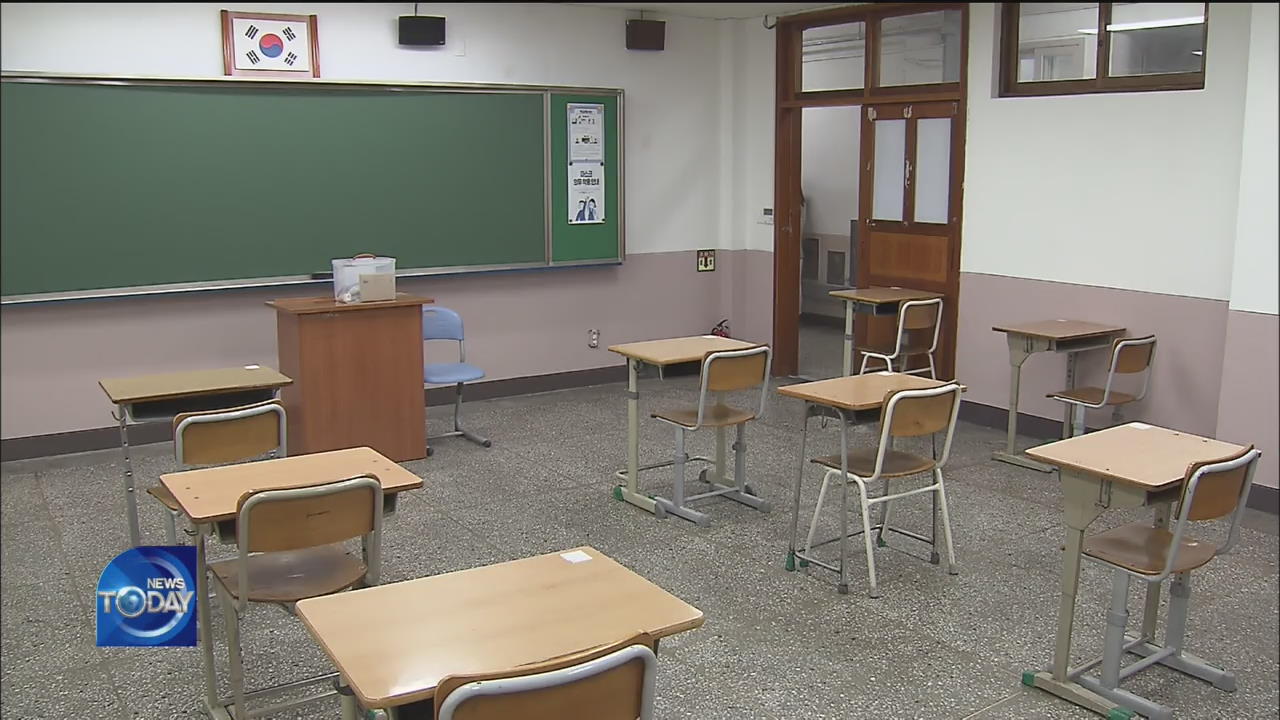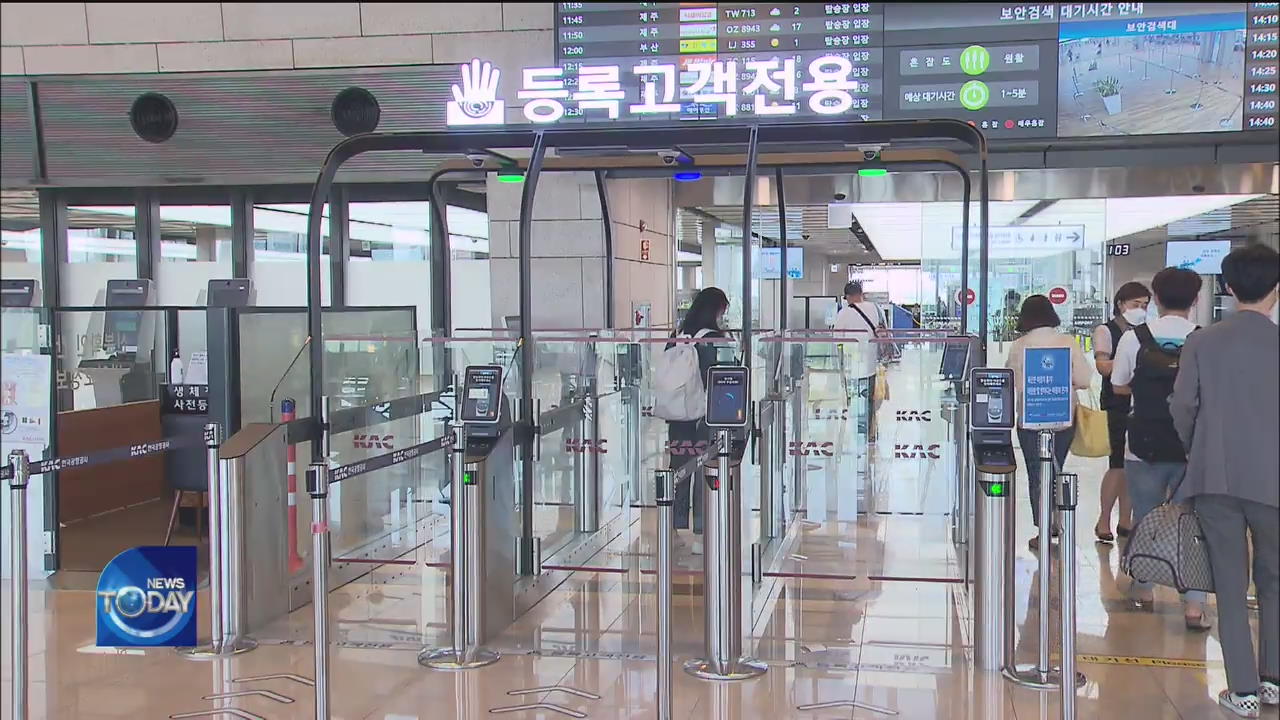SCHOOLS ON ALERT AMID VIRUS RESURGENCE
입력 2020.05.28 (15:18)
수정 2020.05.28 (18:51)
읽어주기 기능은 크롬기반의
브라우저에서만 사용하실 수 있습니다.
[Anchor Lead]
Some 2.37 million students from kindergarten, first, second, 9th and 11th grades started going to school yesterday. But some schools had to send their students back home, because they had found some infections in the student population or nearby communities. To prevent further spreads, educational ministries banned students from visiting internet cafes or noraebangs after school.
[Pkg]
The school gate remains closed and it's quiet inside, once again. A senior in this high school, who returned to class last week, tested positive for COVID-19. Consequently, this school’s 11th graders were told not to come to school yesterday.
[Soundbite] LIM OH-SEOP(DAEGU OFFICE OF EDUCATION) : "The infected student must not have taken his symptoms seriously, so he worked out and met with his friends."
The high school senior had coughs since last Thursday but still had contact with some 50 people until he was tested positive. He met with six friends from other schools to play billiard after school, prompting five other high schools in the area to halt their in-person classes as well. A senior of Sangil Media High School in Seoul was found COVID-19 positive, causing the building to close down for 48 hours.
[Soundbite] (SCHOOL OFFICIAL(VOICE MODIFIED)) : "He must have thought it was a simple cold. But he had a fever and went to a clinic to get tested the day before. He got the test results yesterday."
In the Galmae area of Guri, Gyeonggi-do Province, five schools postponed in-person classes for two weeks and replaced them with remote learning programs. A family of seven that became infected included an elementary school student. This led to nearby schools delaying their schedules. Some 560 schools nationwide postponed in-person classes in the second phase of school opening. Bucheon, Gyeonggi-do Province, where cluster infections occurred in a Coupang distribution center, had the highest number of closed schools with about 250, followed by some 180 schools in Gumi, Gyeongsangbuk-do Province and around 110 in Seoul. The number accounts for roughly 2.7% of 20,902 kindergartens and schools scheduled to open.
[Soundbite] KIM GANG-LIP(CENTRAL DISASTER AND SAFETY COUNTERMEASURES HEADQUARTERS) : "To prevent community infections from spreading to schools, your proactive and responsible actions are more important than ever."
The Education Ministry plans to check the test results and discuss with health authorities before deciding on the school re-opening schedules. The Ministry also delivered guidelines to each school that ban students from visiting internet cafes or singing rooms called noraebangs and stress the importance of adhering to personal hygiene rules.
Some 2.37 million students from kindergarten, first, second, 9th and 11th grades started going to school yesterday. But some schools had to send their students back home, because they had found some infections in the student population or nearby communities. To prevent further spreads, educational ministries banned students from visiting internet cafes or noraebangs after school.
[Pkg]
The school gate remains closed and it's quiet inside, once again. A senior in this high school, who returned to class last week, tested positive for COVID-19. Consequently, this school’s 11th graders were told not to come to school yesterday.
[Soundbite] LIM OH-SEOP(DAEGU OFFICE OF EDUCATION) : "The infected student must not have taken his symptoms seriously, so he worked out and met with his friends."
The high school senior had coughs since last Thursday but still had contact with some 50 people until he was tested positive. He met with six friends from other schools to play billiard after school, prompting five other high schools in the area to halt their in-person classes as well. A senior of Sangil Media High School in Seoul was found COVID-19 positive, causing the building to close down for 48 hours.
[Soundbite] (SCHOOL OFFICIAL(VOICE MODIFIED)) : "He must have thought it was a simple cold. But he had a fever and went to a clinic to get tested the day before. He got the test results yesterday."
In the Galmae area of Guri, Gyeonggi-do Province, five schools postponed in-person classes for two weeks and replaced them with remote learning programs. A family of seven that became infected included an elementary school student. This led to nearby schools delaying their schedules. Some 560 schools nationwide postponed in-person classes in the second phase of school opening. Bucheon, Gyeonggi-do Province, where cluster infections occurred in a Coupang distribution center, had the highest number of closed schools with about 250, followed by some 180 schools in Gumi, Gyeongsangbuk-do Province and around 110 in Seoul. The number accounts for roughly 2.7% of 20,902 kindergartens and schools scheduled to open.
[Soundbite] KIM GANG-LIP(CENTRAL DISASTER AND SAFETY COUNTERMEASURES HEADQUARTERS) : "To prevent community infections from spreading to schools, your proactive and responsible actions are more important than ever."
The Education Ministry plans to check the test results and discuss with health authorities before deciding on the school re-opening schedules. The Ministry also delivered guidelines to each school that ban students from visiting internet cafes or singing rooms called noraebangs and stress the importance of adhering to personal hygiene rules.
■ 제보하기
▷ 카카오톡 : 'KBS제보' 검색, 채널 추가
▷ 전화 : 02-781-1234, 4444
▷ 이메일 : kbs1234@kbs.co.kr
▷ 유튜브, 네이버, 카카오에서도 KBS뉴스를 구독해주세요!
- SCHOOLS ON ALERT AMID VIRUS RESURGENCE
-
- 입력 2020-05-28 15:18:17
- 수정2020-05-28 18:51:17

[Anchor Lead]
Some 2.37 million students from kindergarten, first, second, 9th and 11th grades started going to school yesterday. But some schools had to send their students back home, because they had found some infections in the student population or nearby communities. To prevent further spreads, educational ministries banned students from visiting internet cafes or noraebangs after school.
[Pkg]
The school gate remains closed and it's quiet inside, once again. A senior in this high school, who returned to class last week, tested positive for COVID-19. Consequently, this school’s 11th graders were told not to come to school yesterday.
[Soundbite] LIM OH-SEOP(DAEGU OFFICE OF EDUCATION) : "The infected student must not have taken his symptoms seriously, so he worked out and met with his friends."
The high school senior had coughs since last Thursday but still had contact with some 50 people until he was tested positive. He met with six friends from other schools to play billiard after school, prompting five other high schools in the area to halt their in-person classes as well. A senior of Sangil Media High School in Seoul was found COVID-19 positive, causing the building to close down for 48 hours.
[Soundbite] (SCHOOL OFFICIAL(VOICE MODIFIED)) : "He must have thought it was a simple cold. But he had a fever and went to a clinic to get tested the day before. He got the test results yesterday."
In the Galmae area of Guri, Gyeonggi-do Province, five schools postponed in-person classes for two weeks and replaced them with remote learning programs. A family of seven that became infected included an elementary school student. This led to nearby schools delaying their schedules. Some 560 schools nationwide postponed in-person classes in the second phase of school opening. Bucheon, Gyeonggi-do Province, where cluster infections occurred in a Coupang distribution center, had the highest number of closed schools with about 250, followed by some 180 schools in Gumi, Gyeongsangbuk-do Province and around 110 in Seoul. The number accounts for roughly 2.7% of 20,902 kindergartens and schools scheduled to open.
[Soundbite] KIM GANG-LIP(CENTRAL DISASTER AND SAFETY COUNTERMEASURES HEADQUARTERS) : "To prevent community infections from spreading to schools, your proactive and responsible actions are more important than ever."
The Education Ministry plans to check the test results and discuss with health authorities before deciding on the school re-opening schedules. The Ministry also delivered guidelines to each school that ban students from visiting internet cafes or singing rooms called noraebangs and stress the importance of adhering to personal hygiene rules.
Some 2.37 million students from kindergarten, first, second, 9th and 11th grades started going to school yesterday. But some schools had to send their students back home, because they had found some infections in the student population or nearby communities. To prevent further spreads, educational ministries banned students from visiting internet cafes or noraebangs after school.
[Pkg]
The school gate remains closed and it's quiet inside, once again. A senior in this high school, who returned to class last week, tested positive for COVID-19. Consequently, this school’s 11th graders were told not to come to school yesterday.
[Soundbite] LIM OH-SEOP(DAEGU OFFICE OF EDUCATION) : "The infected student must not have taken his symptoms seriously, so he worked out and met with his friends."
The high school senior had coughs since last Thursday but still had contact with some 50 people until he was tested positive. He met with six friends from other schools to play billiard after school, prompting five other high schools in the area to halt their in-person classes as well. A senior of Sangil Media High School in Seoul was found COVID-19 positive, causing the building to close down for 48 hours.
[Soundbite] (SCHOOL OFFICIAL(VOICE MODIFIED)) : "He must have thought it was a simple cold. But he had a fever and went to a clinic to get tested the day before. He got the test results yesterday."
In the Galmae area of Guri, Gyeonggi-do Province, five schools postponed in-person classes for two weeks and replaced them with remote learning programs. A family of seven that became infected included an elementary school student. This led to nearby schools delaying their schedules. Some 560 schools nationwide postponed in-person classes in the second phase of school opening. Bucheon, Gyeonggi-do Province, where cluster infections occurred in a Coupang distribution center, had the highest number of closed schools with about 250, followed by some 180 schools in Gumi, Gyeongsangbuk-do Province and around 110 in Seoul. The number accounts for roughly 2.7% of 20,902 kindergartens and schools scheduled to open.
[Soundbite] KIM GANG-LIP(CENTRAL DISASTER AND SAFETY COUNTERMEASURES HEADQUARTERS) : "To prevent community infections from spreading to schools, your proactive and responsible actions are more important than ever."
The Education Ministry plans to check the test results and discuss with health authorities before deciding on the school re-opening schedules. The Ministry also delivered guidelines to each school that ban students from visiting internet cafes or singing rooms called noraebangs and stress the importance of adhering to personal hygiene rules.
이 기사가 좋으셨다면
-
좋아요
0
-
응원해요
0
-
후속 원해요
0












![[속보] 심우정 검찰총장 사의 표명…오후 3시 입장 <br>발표](/data/layer/904/2025/07/20250701_1Gcu1S.jpg)
![[속보] 내란 특검, 윤 전 대통령에게 “5일 오전 9시까지 출석” 통지](/data/layer/904/2025/07/20250701_6mdRFo.jpg)

![[영상] 정성호 “검찰 해체 표현 적절치 않아…수사·기소 분리 국민 공감대”](/data/fckeditor/vod/2025/07/01/305901751367182615.png)

이 기사에 대한 의견을 남겨주세요.